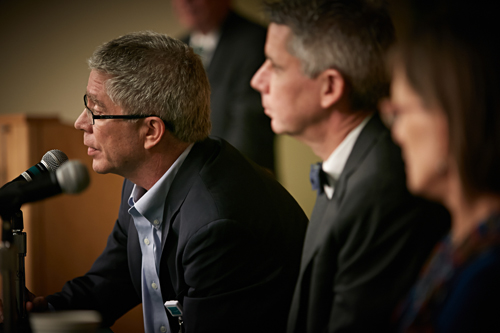Value Institute Symposium explores palliative care

Paramedics rushed Mary Jane Kealey’s mother, Margaret Ellison, to the hospital after she suffered a severe stroke in September, but the 92-year-old matriarch was left with paralysis on the right side of her body and unable to speak. Her family could see that she was in pain. She had been in declining heath for several years and, based on their mother’s wishes, they opted for hospice care.
“She wanted to die with dignity,” Kealey said. Her mother became a patient at Seasons Hospice & Palliative Care at Christiana Hospital. Palliative care, relief from the symptoms, pain and stress of serious illness, is an essential part of hospice care. The change in approach to Margaret Ellison’s care was immediately visible to her family. Her demeanor improved; she was no longer constantly being examined and undergoing tests. The transition was clearly requested in her written end-of-life care preferences.
“Often in medicine we get caught up in medical treatment plans that we feel are appropriate,” said Timothy J. Gardner, M.D., executive director of the Christiana Care Value Institute and medical director of the Center for Heart & Vascular Health. “Often we don’t take the time to really explore with patients and their families what is really most important to them. We face daily dilemmas when facing disease and patients at the end of their lives. We need to learn to speak differently; we need to learn to respond differently.”
Shifting the focus to patients and their families — to the best ways to deliver high-quality, respectful, safe, efficient, equitable care — is the core mission of the Value Institute. At a recent Value Institute symposium, “End-of-Life Care in America: A Clinical and Public Policy Perspective,” national experts joined Christiana Care specialists in exploring the power of palliative care to deliver value to patients and families confronting serious, life-threatening illnesses.
“Palliative care is about paying attention to the person living with illness,” said John J. Goodill, M.D., chief of Christiana Care’s Pain and Palliative Care Section. Dr. Goodill participated in an expert panel discussion during the symposium. “It is the quintessential patient-centered care because it starts with the patients and their goals,” he said.
A wealth of evidence in the medical literature suggests that palliative care delivers real value. For example, a Harvard University-led study of patients with metastatic lung cancer published in The New England Journal of Medicine in 2010 found that early palliative care resulted in better quality of life, fewer patients with depressive symptoms, and nearly three months longer survival compared with patients who received aggressive disease treatment alone.
“If this was a chemotherapy agent … everybody would be on it,” Diane E. Meier, M.D., FACP, founder of the Hertzberg Palliative Care Institute at Icahn School of Medicine at Mount Sinai Medical Center in New York, told the 180 attendees at the symposium. In other words, a drug that produced the same results as palliative care would be a blockbuster, generating billions in revenue for the drug maker. But palliative care often is overlooked in the overall treatment plan.
Dr. Meier and her fellow presenter, David J. Casarett, M.D., MA, director of Hospice and Palliative Care at the University of Pennsylvania Health System, argued persuasively that palliative care provided to patients with serious illnesses — including those continuing to get aggressive diseasedirected treatment — delivers true value measured both in quality-of-life and quality-of-care terms. The two specialists suggested that providing palliative care outside the hospital walls also can accomplish those goals and has the added benefit of reducing costs.
“Providing expert care that our patients and families value — at every stage of health and illness — is integral to The Christiana Care Way,” said Christiana Care President and CEO Robert J. Laskowksi, M.D., MBA.
For Mary Jane Kealey and her mother, Margaret Ellison, that meant providing palliative care that helped the entire family through the difficult end-of-life period.
“They were very loving, very caring,” Kealey said. “We could just see she was happier.”
Dr. Laskowksi explained that “the content of care matters enormously.”
“Our job is essentially a humanistic job,” he said. “It is to help people live lives they want to live. That is easy to say and hard to do. We need to listen to them, and we need to understand what truly makes a difference in their lives.”
The Future of Hospice and Palliative Care with Dr. David Casarett
Matching Care to Patient and Family Needs with Dr. Diane Meier
Photo gallery: Value Institute Symposium
Error fetching Flickr photos: A feed could not be found at `https://api.flickr.com/services/feeds/photoset.gne?lang=en-us&format=feed-rss_200&nsid=28142983@N07&set=72157638864131654&per_page=50`; the status code is `404` and content-type is `text/html; charset=UTF-8`